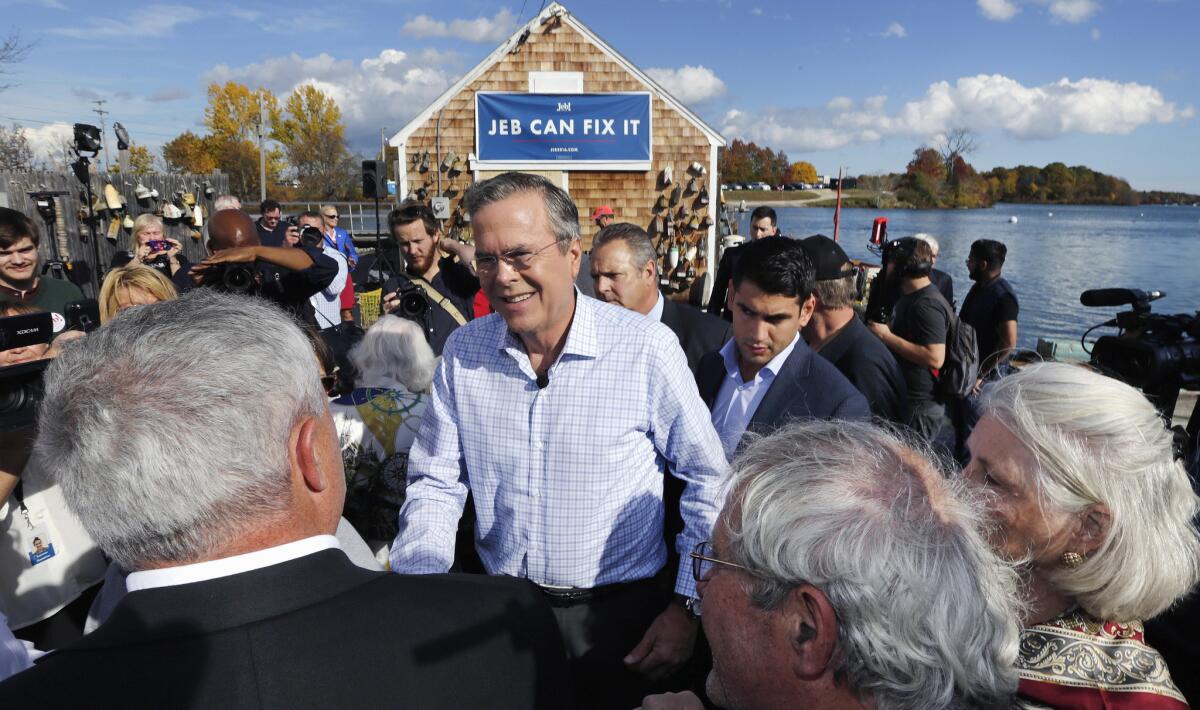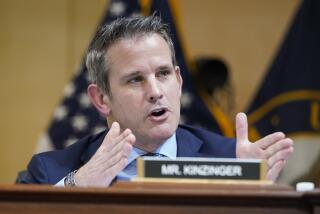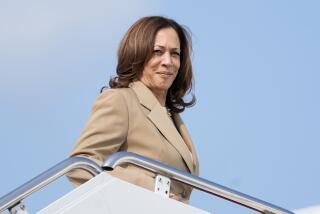All the money in the world may not save Jeb Bush’s campaign

Republican presidential candidate Jeb Bush shakes hands with supporters during a campaign stop in Portsmouth, N.H., on Oct. 29, 2015.
- Share via
Reporting from Washington — The morning after Wednesday night’s Republican debate, Jeb Bush flew to Portsmouth, N.H., where he stood on the waterfront outside a picturesque chowder shop on which his staff had tacked a large sign proclaiming, “Jeb can fix it.”
It’s not clear that he can.
The one-time front-runner in the Republican race, Bush has suffered a steady eclipse for months, first at the hands of Donald Trump and more recently from his fellow Floridian and one-time protege, Sen. Marco Rubio.
TRAIL GUIDE: All the latest news on the 2016 presidential campaign >>
The enormous fundraising success that Bush showed in the first half of the year has long since subsided, with new donors slow to join a campaign that has languished. The campaign has had little success with grass-roots fundraising, leaving it highly dependent on wealthy donors. And the establishment figures who flocked to back him in the spring have grown jittery as winter nears.
The candidate, who once talked of the importance of campaigning with “joy in your heart,” now projects an air of bewildered resignation.
“There are two types of politicians,” Bush said during a brief appearance Thursday outside Geno’s Chowder and Sandwich Shop. “There are the talkers, and there are the doers. I wish I could have done a better job talking on the stage. I wish I could talk as well as some of the people on the stage — the big personalities. But I’m a doer.”
During the debate, Bush went after Rubio, challenging him on his poor attendance record this year in the Senate and calling on him to resign his seat. The campaign had tipped at least some people off that an attack was coming, making it all the more striking that Bush seemed unprepared for Rubio to have a comeback.
“I don’t remember you ever complaining about John McCain’s vote record,” Rubio said, noting that McCain missed even more votes when he ran for president in 2008.
“The only reason why you’re doing it now is because we’re running for the same position, and someone has convinced you that attacking me is going to help you.”
Even among Bush’s friends and supporters, few thought the former Florida governor had won the exchange.
“I think the governor himself will tell you, for whatever reason, his debate performances have not been consistent with his performances throughout the campaign,” said Al Cardenas, a longtime Bush friend and supporter.
“At the end of the day, it’s the governor. He’s got to execute, and he’s well aware, and he wants to perform better in the debates,” Cardenas added. “The drama of a reality-show environment, which doesn’t play to his strengths, has been the predominant factor so far.”
Bush’s campaign spokesman, Tim Miller, acknowledged that the negative headlines had left supporters concerned.
“He has said he is going to continue to improve and get better. He is a competitive guy,” Miller said, noting that the Republican candidates will have another debate in 10 days.
“There are no presidents of the United States that are president because of how they did in an October debate the year before the election,” Miller said. “That’s kind of where we’re at.”
Indeed, there is no question that Bush retains valuable assets for a campaign, starting with a “super-PAC” stuffed with $100 million or more — far more than any of his rivals — and a seasoned staff that knows something about riding the ups and downs of a campaign.
Family history can provide a buoy, too: Bush’s father, George H.W. Bush, was all but written off early in the 1988 presidential campaign before he rallied to win New Hampshire and go on to the presidency.
“It’s too early to suggest it’s over,” said Ed Rogers, a veteran Republican strategist who experienced that campaign and went on to serve in the elder Bush’s White House.
“A lot of what matters lies in front of us, not behind us,” Rogers said.
At minimum, however, the problems Bush has faced this fall have raised the stakes for him in the first few nominating contests, making it all but essential that he win at least one of the first three — in Iowa, New Hampshire and South Carolina. Currently, his best showing among those is fourth place in an average of New Hampshire polls.
And his slide clearly involves problems that are more fundamental than debate performance.
Bush’s own comments Thursday about lacking a “big personality” point to part of the difficulty.
So, too, does his chosen slogan — that he is a “doer,” a problem-solver who can fix things. The concept puts him out of step with many GOP primary voters who have gravitated to candidates who talk of tearing up the political system, not better managing it.
Qualities that Bush’s campaign once viewed as powerful assets — years of experience as governor of the nation’s fourth-largest state and deep family ties to the party establishment — have done little good in an environment in which Republican primary voters say, by better than 2 to 1, that they value “new ideas and a different approach” over “experience and a proven record.”
“Obviously, he’s struggling,” said former Minnesota Gov. Tim Pawlenty, who briefly sought the GOP nomination four years ago before dropping out of the race. “He’s going to have to find another gear and deliver in some way that he hasn’t been able to.”
So far, Bush’s campaign has not found that other gear, instead sticking to its existing playbook.
Thursday, the campaign unveiled an endorsement from another additional establishment Republican — former Sen. Judd Gregg of New Hampshire, who introduced Bush in Portsmouth.
SIGN UP for the free Essential Politics newsletter >>
And backers insist that Bush’s strategists have a long-term blueprint that will prove correct over time.
“I know this man’s experience. I’m hiring someone to run the biggest business in the world,” said Mel Sembler, a longtime Bush family fundraiser in Florida who served as ambassador to Italy under President George W. Bush.
Sembler said he had been reassuring donors that Bush will be the last candidate standing as the next phase of the campaign wears down his competitors. But other candidates have been trying to woo Bush donors, just in case. Carly Fiorina spent an hour in his St. Petersburg office last week, Sembler said.
Among other Bush backers, some said that the campaign’s problems had been oversold in the media.
Zach Zachariah, a Fort Lauderdale Fla., cardiologist who has held two Bush fundraisers at his home and has been a major fundraiser for the family for three decades, insisted there was no reason to worry.
“Absolutely not,” he said. “All you see right now is a bunch of noise.”
Zachariah said he would like to see Bush’s poll numbers go up but will wait until after New Hampshire and South Carolina, where he still expects Bush to do well, before assessing the campaign.
“I wouldn’t say it was a stellar [debate] performance by any means, but I do think we’re still a long ways away from when the first caucus and primary take place,” added Susan McCaw, a major Bush donor who served as ambassador to Austria under George W. Bush. “I just think he needs to get his message across more succinctly that he really is the candidate that, one, can beat Hillary and, two, has the track record and experience to lead our nation longer term.”
Outside the campaign, the analysis was more sober.
“Every candidate has to walk lonely miles through the valley of the shadow of political death,” said Steve Schmidt, a Republican strategist who worked as a senior advisor to John McCain’s 2008 presidential campaign. “Bush is walking those miles now.”
Lauter and Bierman reported from Washingotn and Mehta from Los Angeles. Staff writer Kurtis Lee in Los Angeles contributed to this report.
For more on the 2016 campaign, follow @DavidLauter, @LATSeema and @NoahBierman
ALSO:
14 million viewers for debate sets a record for CNBC
Third GOP debate appears to broaden field, not winnow it
Review: Yes, Ted Cruz, CNBC’s Republican debate was a cage match
More to Read
Get the L.A. Times Politics newsletter
Deeply reported insights into legislation, politics and policy from Sacramento, Washington and beyond. In your inbox three times per week.
You may occasionally receive promotional content from the Los Angeles Times.













